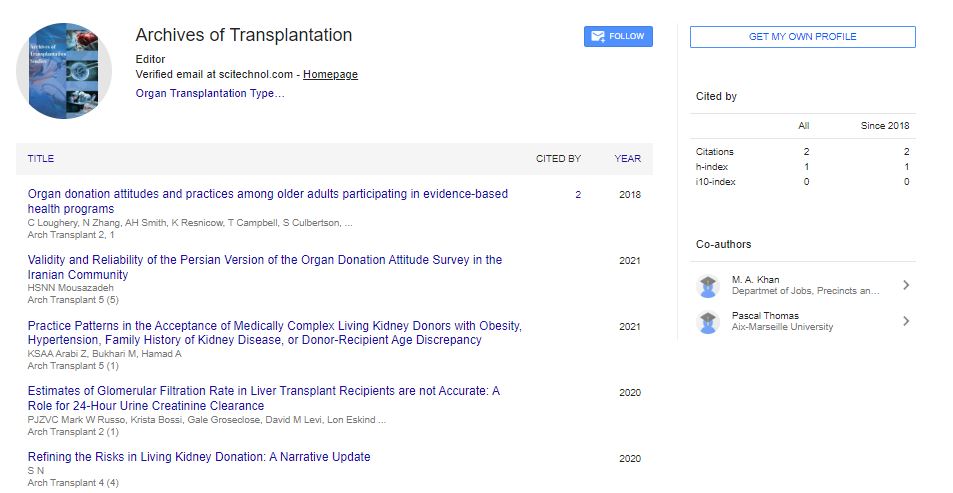Editorial, Arch Transplant Vol: 5 Issue: 4
Regulation of Polycystic Expression Oran Trafficking
Jinghua Hu*
Department of Biochemistry and Molecular Biology, Mayo Clinic, Rochester, MN, USA
*Corresponding Author:
Jinghua Hu, Department of Biochemistry and Molecular Biology, Mayo Clinic, Rochester, MN, USA ,E-mail: hu.jinghua1@mayo.edu
Received date: July 01, 2021; Accepted date: July 22, 2021; Published date: July 29, 2021
Keywords: World Health Company
Introduction
Organ change is the buying and selling of human organs, tissues, or other body products, generally for transplantation. Consistent with the World Health Company (WHO), organ change is a commercial transplantation in which there may be a earnings, or transplantations that takes place outside of national medical structures. There’s a global want or call for wholesome body parts for transplantation, which exceeds the numbers to be had. There may be a global shortage of organs available for transplantation, yet the commercial change of human organs is illegal in all countries besides Iran. In spite of these prohibitions, organ trafficking and transplant tourism continue to be giant. The question of whether to legalize and regulate the organ trade to fight unlawful trafficking and organ scarcity is substantially debated. This dialogue generally centres at the sale of kidneys via dwelling donors; considering human beings are born with kidneys however need best one to live on. Iran is the most effective country that permits organs to be offered and sold for cash. Because of loss of infrastructure to maintain a green organ transplant machine inside the early 1980s, Iran legalized residing non-related donation of kidneys in 1988. The Charity affiliation for the guide of Kidney sufferers and the Charity basis for unique sicknesses manipulate the exchange of organs, with the help of the authorities. These non-profit businesses match donors to recipients, setting up exams to make sure compatibility. Donors receive tax credit reimbursement from the government, unfastened health care insurance, and frequently direct fee from the recipient with the average donor being paid $1,200. Some donors are also offered employment possibilities. Charity organizations aid recipients that cannot find the money for the fee of the organ. Proponents of legalized organ alternate have hailed the Iranian machine for example of a powerful and secure organ trading model. In addition, the LNRD model is compatible with the social climate in the non-secular practices in Iran stymies donation subculture in the country as organ donations is frequently regarded as taboo. In 2017, from a possible 8000 cases of mind death, 4000 organs have been viable, but handiest 808 have been transplanted because of lack of consent. Even though all nations aside from Iran prohibit economic transactions for organs, most permit "paired donations" or kidney swaps throughout a couple of parties. Paired donations deal with the problem of tissue compatibility in organ transplants. As an example, you could desire to donate a kidney to your partner however cannot to because of antibody incompatibilities. But, your kidney is a superb match for a stranger who occurs to be married to a person whose kidney might be well matched along with your spouse. In a paired donation, you would comply with donate your kidney to the stranger, in change for the stranger's partner promising to donate a kidney to your spouse. Such paired donations are arguably a form of organ sale – rather of purchasing a kidney for a loved one with coins; someone pays for it along with her own kidney. In fact, within the us, the unfold of kidney paired donations become to begin with stymied because of language in the national Organ Transplantation Act barring the switch of human organs for "treasured attention". It became only after the regulation changed into amended to specially permit for kidney paired donations that the practice has become popular. The worldwide community has issued many ordinances and declarations against the organ trade. Examples include the arena clinical Authority's 1985 denouncement of organs for commercial use; the Council of Europe's convention on Human Rights and Biomedicine of 1997 and its 2002 non-compulsory Protocol concerning Transplantation of Organs and Tissues of Human starting place; and the announcement of Istanbul on organ trafficking and transplant tourism. The assertion of Istanbul defines transplant commercialism, organ trafficking, and transplant tourism. It condemns these practices primarily based on violations to fairness, justice, and human dignity. The announcement pursuits to sell moral practices in organ transplantation and donation on a worldwide stage. It’s far nonbinding, but over 100 transplant companies assist its ideas, along with international locations inclusive of China, Israel, the Philippines, and Pakistan, which reinforced their legal guidelines in opposition to illegal organ trading after the statement's release.
